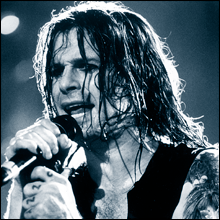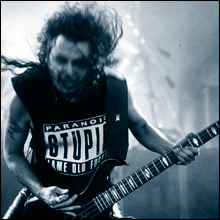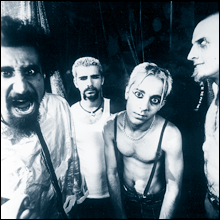![[Sidebar]](/standard/image/sidebar.gif)
![[Music Reviews]](/standard/image/headers/music_reviews_header.gif)
| clubs by night | club directory | bands in town | concerts | hot links | reviews & features |
Ozzy über alle
In the unpredictable concert business, metal still rules
by Ted Drozdowski
Ozzy Osbourne
One of the sounds of summer, as dependable as the chirp of crickets, is the blend of a double kick drum and roaring amplifiers -- the thunder of heavy-metal and hard-rock concerts. Although the success of tours by classic rockers and all except the most popular of contemporary stars varies region to region (and with reports of inconsistent local draws on the likes of everyone from Paul Simon and Brian Wilson to Barenaked Ladies, John Mellencamp, and the hip, DJ-based Area:One show), metal consistently draws a strong, mostly male audience from coast to coast. So even as teen idols and rappers dominate the pop charts and get the most media attention, it's metal that rules the nation's outdoor sheds and arenas.For good reason: the outdoors is ideal for the oversize theatrics, volume, and personas that account for much of the enduring entertainment value of metal and hard rock. Bands like KISS and Black Sabbath helped pioneer the pyrotechnics, elaborate lighting, and costumes that were once a defining factor in major concerts. Their efforts were sustained through the '80s by the flashpots and props of metallurgists like Metallica and Iron Maiden, and more recently elevated to perhaps unintentionally comic heights by the likes of Slipknot, who wear masks and pummel one another mercilessly on stage.
There's also a more practical explanation for the style's status as a performance music since the 1970s. Radio play for metal declined at the end of the arena-rock era, when it was pushed out of the mainstream first by disco's dance culture and then by the sleeker sound of new wave and punk-inspired pop. A few bands -- Def Leppard, Poison, Mötley Crüe, Van Halen -- broke through to the Top 40, but just a few. Today only the biggest and best-marketed new-metal acts are embraced by the so-called "Active Rock" radio format, which emerged in the late '90s to tap the buying power of the young males who purchased millions of albums by Tool, Korn, and other hard, loud outfits. The rest are part of a sprawling subculture where both bands and fans thrive on word-of-mouth generated by shows and tape swapping. And wait for summer to converge at the major concerts that are the gatherings of their tribe.
"When I was a kid going to my first shows, I learned that's how you find out about heavy music," says Shavo Odadjian, bassist for the Los Angeles crunch-rock outfit System of a Down. His group's follow-up (American Recordings; due in late August) to their near-platinum debut, System of a Down, is creating a hopeful buzz among retailers who are strapped by poor overall sales. (See "Can Metal Rescue the Retail Market?", below.) "Heavy music is live music, and it always has been," Odadjian continues. "When we started our band, we played live everywhere we could -- live, live, live, live, live. And that's how people found out about us, because heavy music hardly gets played on the radio. So you know you've got to see it, or hear about it from your friend who saw it. And if you're not there yourself when the new bands come to town, right down in the pit like I was, you could be missing the coolest new music. So you gotta be there."
Slayer
It's that attitude that makes metal and hard-rock fans such a dependable source of major-concert revenue for promoters. In keeping with summer-music business as usual, current tours by Massachusetts's Staind and California's Tool are riding high on live-performance industry newspaper Pollstar's box-office charts -- the latter at #4. A second date at the Tweeter Center in Mansfield has just been added to the successful double-bill roadshow of Bostonians Godsmack and Sacramento's Deftones. That means the Cambridge-based regional division of mega-promoter Clear Channel Entertainment, formerly SFX Music, expects a sellout or near-sellout of the 19,900-ticket venue on August 24 and a solid showing for the 25th. The tour also plays the horribly named CTNow.com Meadows Music Center in Hartford on August 23.But before then the king of metal package tours, OzzFest, will check into the Tweeter Center on August 7 and 8. And when summer ends, a hotly awaited union of System of a Down and Slipknot will begin its American trek, followed by a reincarnation of the successful, Korn-headlined "Family Values Tour."
OzzFest -- the six-year-old mix of new and established artists headlined by Ozzy Osbourne or, as is the case this year, a reunion of his metal-defining group Black Sabbath -- has become one of the most formidable events in the music industry. The current line-up includes Marilyn Manson, Slipknot, Papa Roach, Crazytown, and Linkin Park, as well as a second stage where Mudvayne, Taproot, American Head Charge, and other relative newcomers will perform. The day-long festival is the brainchild of Osbourne's manager and wife, Sharon Osbourne, and it has become to metal nation what the now-defunct Lollapalooza was to alternative rock. Last year it was the nation's top-grossing concert tour.
"OzzFest has sold out every year since its inception, and this summer will be no exception," says Jodi Goodman, vice-president of artist development and talent buying for Clear Channel Entertainment's local operation. "From a business viewpoint, what makes OzzFest thrive is the legendary status of Ozzy Osbourne, the continuation of creative packaging, and the loyalty behind this genre of music. All packages and tours are talent-driven, and OzzFest always has a strong stable of talent on the bill. OzzFest has thrived better than Lollapalooza in its prime, despite the fact that many of the bands on OzzFest are either relative newcomers or enjoy little radio play."
So it is safe to predict that over both days of its Mansfield stay OzzFest should sell nearly 40,000 tickets. These are priced at $75.25 for shed seats and $38.50 for the lawn, which means the box-office gross should be more than $1 million per concert. Then there's the income from the merchandising of T-shirts and other souvenirs. Goodman notes that merchandising at metal shows is especially lucrative because of "a big pride factor" in the dedicated fans that Shavo Odadjian speaks of. "Metal is still somewhat independent of radio and commercial success," Goodman elaborates. "It has a strong underground following that has always been in place, like with Korn, Tool, and Rage Against the Machine. Many kids identify with its organic, raw power. They can discover this music themselves, and the young male demo is very active for live music. Merch is very strong for this reason."
System of a Down
If a mere 10 percent of both day's attendees buy this year's $32 OzzFest T-shirt, with a devil extending his middle talon on the front, that's another $128,000 in revenue. Then there are food and beverage sales, which get a boost from OzzFest's being a day-long affair. All of this amounts to a very impressive pile of dollars.OzzFest, "Family Values," and other package tours have become the key to taking a metal band to the mainstream and the gold and platinum sales mark. "At OzzFest," observes David "Beno" (say "Bean-o") Benveniste, "you'll see a 40-year-old with a beer belly digging the bands and a 14-year-old kid wearing make-up. That's where the old meets the new, so there's no better spawning ground for a band to go in as a baby band and come out blowing up." Benveniste manages System of a Down and Slipknot, among other groups, and runs a marketing and promotions company called StreetWise Concepts & Culture. (See "Takin' It to the Streets," above.) He says that System of a Down's two years of exposure on OzzFest's main stage is what finally compelled radio programmers to tumble for their breakthrough single "Sugar" after their debut CD had long been in stores. " `Sugar' got a lot of airplay after they said it would never get airplay. OzzFest is also where Limp Bizkit blew up, Soulfly, many others."
It helps that Benveniste is a master of a style of word-of-mouth marketing that gets right to the hearts of metalheads and hard-rockers. Before System of a Down were signed, he recruited fans in Los Angeles to put up posters, pass out flyers, and give away tapes to bolster attendance at System's shows. They worked 'zines and logged on to Internet chat rooms to help build a buzz. "After pounding the streets in Los Angeles for nine months, we took it national after they got signed in 1997." Today StreetWise Concepts & Culture has access to a worldwide network of 40,000 metal and hard-rock fans. Labels have contracted the company to build grassroots support for albums by Linkin Park, Papa Roach, the Deftones, Alien Ant Farm, and even Foo Fighters. "We go to chat rooms, send kids tapes, let them know a band's coming to town. Psychologically these kids feel like they found this music, and when they know it's going to radio, they request it on their own. And when radio play meets the streets, that's when things really go."
This year Sharon Osbourne turned OzzFest's second stage over to Benveniste and StreetWise. "We've had tentacles all over the nation spreading word on OzzFest seven to eight months before it went out," he explains. "We floated the names of bands that might be touring with OzzFest and got feedback from the fans back to Sharon. When you leak information to the Internet about a tour that has some attractive elements, kids log on because they want to be the first to tell their friends." Benveniste also designed a forum for fans to vote for bands who might appear on the second stage. Shavo Odadjian offers System of a Down's perspective on its OzzFest involvement: "It built us. OzzFest brought us to a whole new audience. It gave us credibility with a strong fan base and made a lot of connections for us, because bigger bands watch you while you play."
Such packages also provide better touring economics for many bands. "A lot of times when we do our own tours, we carry the lights, sounds, and other production expenses," says Slayer frontman Tom Araya. "When someone invites you on their tour, the only expense you have is your crew and your gear."
Slayer, who're marking two decades as a blood-and-guts metal band this year, are currently part of the "Extreme Steel Tour," an event that's headlined by Pantera and shared by StaticX, Morbid Angel, and Skrape. It's the only notable metal or hard-rock roadshow of the summer that's playing indoor arenas rather than outdoor sheds. The reason? "Air conditioning," Araya deadpans. "It's on all the posters!" Fans, however, seem cool to the tour, which is not on Pollstar's Top 50 chart. Perhaps "Extreme Steel" would do better in more relaxed outdoor venues or with a more formidable headliner. Either way, Slayer are reserving their big push for a tour in the fall or winter to follow up the late August release of their eighth album, God Hates Us All (American).
That's a near-perfect title for a metal CD. It's the kind of conclusion one draws while in the midst of adolescent turmoil. Not as poignant as the lyrics of Staind's contemplations of suicide, unchanneled rage, and psychological pain. Not as hard-focused as System of a Down's reflections on political corruption and the market-driven mind games of the mainstream youth culture. Yet it's part of the language of alienation and sonic extremity that has spoken so eloquently to the youthful audience of metal and hard rock for decades -- and provided the music with staying power that the industry can, and does, bank on.
Can metal rescue the retail market -- for now?
Concert promoters aren't the only segment of the music business that's expecting a windfall from the season's hail of metal and hard rock. Music stores have been looking forward to the arrival of new CDs by Slipknot (out this past July 17) and System of a Down (due in late August), plus continued strong sales of recently released discs by Staind and Tool as both bands tour.Music retailers have been in distress since the middle of last year, when overall sales of CDs, cassettes, and singles went into decline. A number of major chains have been shaken by the 4.7 percent drop at the cash registers from 1999 to 2000, including Tower Records, which has radically trimmed personnel and filed for protection from creditors while reorganizing.
Although music retailing remains a $14.3 billion business, store operators -- already coming off a flat-sales winter -- were further disappointed when the latest releases from Ricky Martin, Rage Against the Machine, Eve, R.E.M., and other major stars failed to be blockbusters. Save for 'N Sync, whose new album is expected to fall short of their previous releases as teen-pop enthusiasm reaches its limit, no superstar discs are in the wings. That leaves metal as the biz's most likely near-term savior. If the aggressive sales of Tool's latest album, which debuted at #1, and Boston outfit Staind's Break the Cycle (Flip/Elektra), which also debuted at #1 and sold 716,000 copies in its first week, are any indicator, retailers will get another shot in the arm from the appearance of Slipknot's Iowa this month and System of a Down's late-August unveiling of Toxicity, the much buzzed-about follow-up to their near-million-selling debut, System of a Down. Street marketing has been under way for months for these albums, and radio is expected to embrace both of them, further fueling customers' enthusiasm. "We're looking forward to those releases, but I don't know if they're going to make the industry bounce back to where it was," says Beth Dube, vice-president of music purchasing at the Boston-based Newbury Comics chain. "The labels need to reconsider their release schedule -- stop releasing all the big titles in the fourth quarter and release some of them over the summer. That would help overall sales."
Like most music chains, Newbury Comics does well with the teen artists on the charts, as well as with rap -- the new D12, for example -- and major pop and alternative-rock releases. But Newbury Comics has particularly strong roots in the metal market, with a long history of carrying a deep inventory of independent label titles.
"We've always sold a lot of underground metal," Dube explains, "We've been selling Slipknot albums before they bubbled over into the mainstream, and when something like that happens, sales of those artists really take off for us. We were excited about the Staind record. Although the single [the acoustic "Outside," which also features Limp Bizkit's Fred Durst] was not very metallic, it crossed the band over to the mainstream, which is why this record has got legs."
Dube expects both Toxicity and Iowa to debut in Newbury Comics' Top 10. "We're expecting System of a Down to do well in particular. Their first album is still selling well, and there's a lot of excitement about the band. They're managed by a company that does a great job in street marketing."
OzzFest and this summer's other metal tours plus the System of a Down and Slipknot "Pledge of Allegiance" double bill that will launch October 1 in Las Vegas are also good for retailers. Dube notes that touring is the key to stimulating sales of metal and hard rock, a genre where mainstream airplay is generally restricted to only the biggest, best-marketed acts. "We notice strong sales especially when a band plays the suburbs, like the Worcester Palladium or the Tweeter Center."
-- TD
Takin' it to the streets
"When you're dealing with heavy music, you sell records by word of mouth more so than radio," says David Benveniste. To that end, the LA band manager and entrepreneur has built a network of 40,000 music fans throughout the world that can be tapped by his StreetWise Concepts & Culture.The company germinated through his grassroots efforts at marketing and promoting System of a Down, whom he manages. When System's homonymous 1997 CD debuted, it sold 4000 copies the first week with absolutely no commercial airplay. Nearly a million sales later, "Chop Suey," the first single from System's follow-up, Toxicity (due in stores late August), was added by LA's tastemaker station KROC, on July 11.
Another testament to the effectiveness of StreetWise's way of doing business -- mailing advance tracks from forthcoming albums to its network, soliciting opinions on potential concert line-ups, using the Internet to alert people to concerts and band news -- is the contracts from labels that the company has received to seed the market for albums and tours by Papa Roach, Linkin Park, and a plethora of other artists capped by Radiohead and Foo Fighters. "The kids in our network are so organized, the word spreads almost instantly to fans all over the world, and we constantly get an incredible amount of feedback."
To an extent, Benveniste even lets his network make business decisions for him. "It's all about credibility. I ask them if we should take on certain bands, and if their response is negative, we don't do it. I can name 10 bands we've passed on, because it's about trust."
He also tries to make good on the "Concepts & Culture" part of his company's name by sending out reports on the environment and on social issues. "We're building up a lot of influence. Maybe enough to do some work for good. I hope that one day I'll be able to take the whole thing political."
| home page | what's new | search | about the phoenix | feedback |
Copyright © 2000 The Phoenix Media/Communications Group. All rights reserved.


